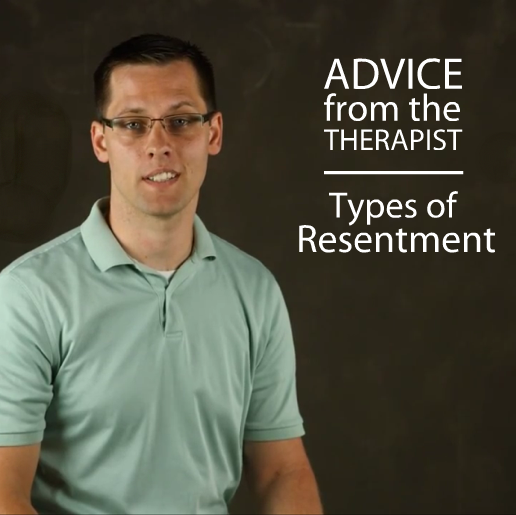
Advice from the Therapist Vlog: Types of Resentment
August 2014 Vlog, Advice from the Therapist: Types of Resentment
Therapist Zachary Sander, MA, LPC, CADC speaks on different types of resentment and how to deal with it in order to resolve past conflict within relationships. Be on the look out for new installments of ‘Advice from the Therapist’ each month pertaining to guidance, services, and more!
Transcription:
On today’s installment, I will be talking about the types of resentment one would need to deal with to work through conflict in the past. Not Dealing with our resentments will develop spiritual ramifications such as blocking our ability to forgive and allowing the past to hold us back from moving forward in the purpose and direction God has for us causing impairments in our daily functioning. I will be using three different languages of origin from which our english language derives the word resentment to explain this.
The first language of origin is French, from which we get the word “Ressentir”, this is the closest to our modern day language definition of resentment. First, you have the prefix, “re”, which means something that is repeating or happening again. The French word, “sentir”, is to be angry which is an emotion. Just thinking about the conflict that has occurred can lead us back to the raw or cultivated emotion.
For example, someone carjacked by gunpoint, the raw emotion is fear because it is happening at the time of the incident. A cultivated emotion can be developed after the incident has occurred, and repeated, like anger towards the carjacker. A second example, is someone that grew up without a father. The raw emotion can be hurt, abandonment, rejection; the cultivated emotion can be anger and hatred due to the abandonment.
Anger is often a secondary emotion to the initial emotion the person is feeling such as abandonment, fear, hurt, guilt, embarrassment, and shame. The secondary emotion of anger can be used as a defense mechanism to prevent us from experiencing the first painful or raw emotion. A good way to know if you have this type of raw or cultivated resentment, is to ask yourself, what emotions do you experience after thinking about a person who has wronged you? If we do not work through our raw or cultivated emotions, we are doomed to live in bondage by them fermenting our bitterness.
The next language of origin is Old French from which we have the word, “Ressentir”. Once, again we have the “Re”, which means repeating or happening again. The Old French word, “Sentir”, means equivalent. This has to do with trying to sort out justice and how to get back to a status of fairness, homeostasis, evenness, or stability. A repeated desire for revenge can occur.
A definition of resentment has been stated this way,
Chip Ingram described a helpful way to determine whether you have forgiven someone or not, he said,
Until then, a sense of revenge can be holding you back.
Another type of thinking that can occur, are thoughts of unfairness, which can lead to difficulty understanding how we see our self worth. For example, the person whose parents were not there, or were abusive, could be led to believe ‘maybe I don’t have worth due to how I was treated’. The actions of the parents to the child becomes the way the child sees self worth and can continue throughout adulthood unless beliefs are confronted. Also, thoughts of unfairness can lead to difficulty understanding how to trust others. The actions of the parents are unsafe, unstable, which makes it unsafe or unstable for the child to trust the parents or, possibly, others.
The third, and final, language of origin is Latin, where we get the word “sentire”. Sentire translates to mean our five physical senses, see, touch, hear, smell, and taste. There are two parts to the physical sensations that relate to resentments. The first, is the physical effects that can reoccur due to emotions reoccurring. As you may recall when I discussed the French derivative, ressentir, I discussed an emotion repeating due to the thinking about the negative situation that has occurred in the past.
An emotion can evoke physical responses. Let’s take a look how. Fear is an emotion. Think about the physical sensations caused by experiencing fear, a racing heartbeat, muscle tension, jitteriness, shortness of breath, headache, and migraine. The second part, which may happen in extremely traumatic situations, are through flashbacks. Flashbacks have sensory hallucinations that can occur alongside thoughts of past trauma so it is as if the conflict or trauma, through some sort of physical sensation, is reoccurring.
An example of this, would be a war veteran of Iraq that drove humvees through a place that often has IEDs planted, reported driving down the highway back home, and started visualize the desert-like conditions on the side of the road.
So to recap what we have discussed, it is important to work through resentments holistically by dealing with the reoccurring thoughts and beliefs, emotions, and physical sensations that can coincide with resentments. Now, I’ve only discussed a few aspects of resentment that one would need to deal with to work through conflicts in the past. So if you struggle with any of these forms of resentment and would like help battling against these, give us a call at Agape Christian Counseling Services, and our counselors would be happy to give you the support needed.




